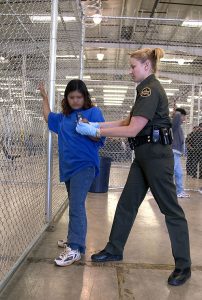
Starting March 12, a team of eight SMU Dedman School of Law students led by professor and immigration law expert Natalie Nanasi, will spend their spring break providing pro bono legal services to these undocumented immigrants, hoping to win them asylum in the United States. The Karnes City center, operated by Immigration and Customs Enforcement in the U.S. Department of Homeland Security, has been open since 2014, housing women and children who have crossed the border into the South Texas.
“A majority of the Karnes City detainees are coming from El Salvador, Honduras and Guatemala and fleeing gang violence, family violence or some combination thereof,” Nanasi said. “Their trip is supremely dangerous. Many don’t make it, and that’s something important to remember; these people flee because they know that if their daughters stay there, it’s certain they’ll be raped, and if their sons stay there, it’s certain they’ll be kidnapped by gangs.”
“As dangerous as the trip to the United States is, that risk is still better than the certainty of what will happen to them if they stay where they are,” Nanasi added.
Nanasi’s students will work 12-hour days conducting intakes, interviewing detainees, preparing clients to express why it’s dangerous for them to return to their home countries in credible fear interviews and hearings before Immigration Judges, and conducting pre-release orientations.
The students have also been encouraged to record video blogs at the end of each day documenting their experiences. These videos will be posted online here (link).
“The students are going to see how important lawyers are in ensuring justice,” Nanasi said. “They will learn how to be a lawyer in a cross-cultural way, they will learn how to present evidence before an adjudicator, they will learn empathy and they will learn how to work hard for an important cause. I have high hopes and expectations.”
Asylum claims can take two or three years to process before a day in court arrives. If Nanasi and her students can earn the detainees their release from Karnes City, the free detainees will then have to find a lawyer who can start building their cases for the asylum courts they’ll still eventually have to face.
“The first goal for these women and children is to stay (in the United States) tomorrow,” Nanasi said. “The ultimate goal is to become citizens.”
The trip is sponsored by SMU Dedman School of Law’s Hunter Center for Victims of Crimes Against Women.




